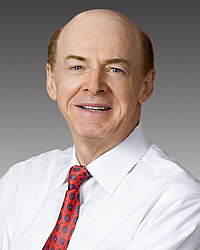
Toronto City Council is the governing body of the municipal government of Toronto, Ontario. Meeting at Toronto City Hall, it comprises 25 city councillors and the mayor of Toronto. The current term began on November 15, 2022.

Tony Ruprecht is a former Canadian politician. His first elected position was as an alderman in the old Toronto City Council, in the late 1970s. He became a member of the Legislative Assembly of Ontario in 1981, and served in premier David Peterson's cabinet as minister without portfolio from 1985 to 1987. Ruprecht represented Toronto's Parkdale and then Davenport constituencies for the Liberal Party of Ontario for 30 years. On July 5, 2011, he announced that he was leaving politics and would not seek re-election in the October 2011 provincial election.

Joe Mihevc is a Canadian politician who was appointed to represent Ward 10 Spadina—Fort York on Toronto City Council on June 1, 2022. He was previously elected to represent Ward 21 St. Paul's from 2000 to 2018, Ward 28 York Eglinton from 1998 to 2000 and was a York City Councillor from 1991 to 1997.

The Chairman of the Municipality of Metropolitan Toronto or Metro Chairman was the regional chair of Metropolitan Toronto, Ontario, Canada, and the most senior political figure in the municipality. The Metro Chairman was elected by the members of Metropolitan Toronto Council.
Anthony "Tony" Edward O'Donohue was a former municipal politician in Toronto, Ontario, Canada.

The 1991 Toronto municipal election was held on November 12, 1991 to elect councillors in Metropolitan Toronto, Ontario, Canada, and mayors, councillors and school trustees in Toronto, York, East York, North York, Scarborough and Etobicoke.
The Toronto municipal election of 1978, held on Monday, November 13, 1978, was the first seriously contested mayoralty race in Toronto, Ontario, Canada, since David Crombie took office in the 1972 election. Crombie left municipal politics earlier in 1978 to seek and win a seat in the House of Commons of Canada as the Progressive Conservative Member of Parliament for Rosedale electoral district.
The 1985 Toronto municipal election was held to elect members of municipal councils, school boards, and hydro commissions in the six municipalities that made up Metropolitan Toronto, Ontario, Canada. The election was held on November 12, 1985.
The Toronto municipal election of 1976 was held on December 6, 1976 in Metropolitan Toronto, Ontario, Canada. Mayors, city councillors and school board trustees were elected in the municipalities of Toronto, York, East York, North York, Etobicoke and Scarborough.
The 1982 Toronto municipal election was held on November 8, 1982, in Metropolitan Toronto, Ontario, Canada. Mayors, controllers, city councillors and school board trustees were elected in the municipalities of Toronto, York, East York, North York, Etobicoke and Scarborough.
The 1980 Toronto municipal election was held on November 10, 1980 in Metropolitan Toronto, Ontario, Canada. Mayors, controllers, city councillors and school board trustees were elected in the municipalities of Toronto, York, East York, North York, Etobicoke and Scarborough.
The 1974 Toronto municipal election was held on December 2, 1974 in Metropolitan Toronto, Ontario, Canada. Mayors, controllers, city councillors and school board trustees were elected in the municipalities of Toronto, York, East York, North York, Etobicoke and Scarborough.

Municipal elections were held in Toronto, Ontario, Canada, on December 1, 1969. Across Metro Toronto there were few surprising results, and city of Toronto incumbent mayor William Dennison was easily re-elected. The one dramatic exception to this was on Toronto city council, where a number of long-standing members lost to young new arrivals who shared a common vision of opposition to the megaprojects that had transformed Toronto throughout the post-war period. While the reform movement candidate for mayor lost, it gained a strong presence on city council. The 1970s reform faction dominated Toronto politics for the next decade.
The 1972 Toronto municipal election was held December 4, 1972, to elect the governments of Toronto, Ontario, Canada, the five other boroughs, and the government of Metro Toronto as well.
Municipal elections were held in Toronto, Ontario, Canada, on December 5, 1966. The elections were the first in Toronto after its merger with several smaller suburban communities on January 1, 1967. Forest Hill and Swansea were annexed by the City of Toronto, Leaside was merged with the Township of East York to become the Borough of East York. Weston was combined with the Township of York to form the Borough of York. The Village of Long Branch and the towns of Mimico and New Toronto were merged with the Township of Etobicoke to form the Borough of Etobicoke.
Municipal elections were held in Toronto, Ontario, Canada, on December 3, 1962. Incumbent mayor Nathan Phillips, then the longest-serving mayor in Toronto history, lost to Controller Donald Summerville by a significant margin.
Municipal elections were held in Toronto, Ontario, Canada, on December 1, 1958. Four year incumbent mayor Nathan Phillips won reelection against Controller Ford Brand, who was supported by the Co-operative Commonwealth Federation and Toronto Labour Council, and Controller Joseph Cornish.
Municipal elections were held in Toronto, Ontario, Canada, on December 3, 1956. Incumbent mayor Nathan Phillips was easily reelected. Jean Newman became the first woman elected to the Board of Control, and topped the poll to become budget chief.
Municipal elections were held in Toronto, Ontario, Canada, on January 1, 1947. With little serious opposition Robert Hood Saunders was re-elected as mayor.
Gordon Cressy is a former Canadian politician, who served on Toronto City Council from 1978 to 1982.






